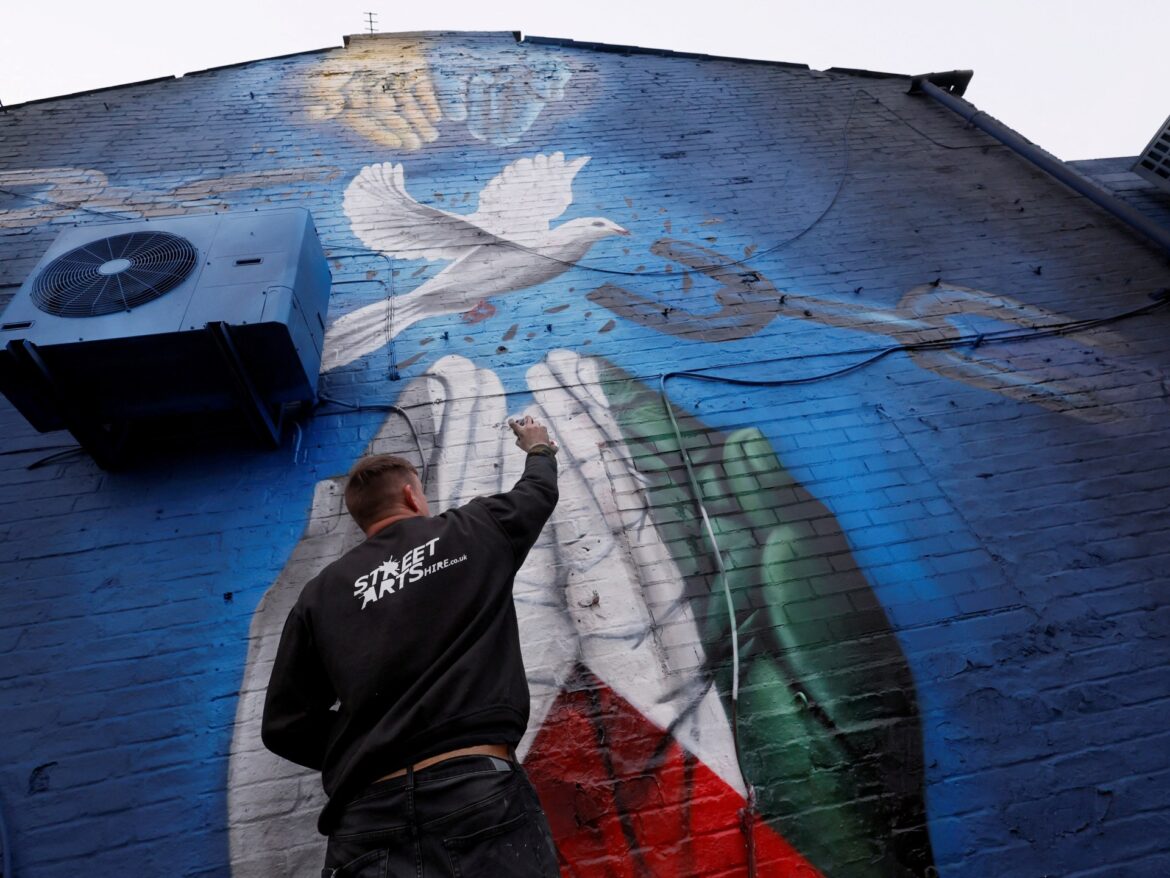Names marked with an asterisk* have been changed to protect identities.
When Russia launched a full-scale war against Ukraine on February 24, 2022, Amer Aroggi, a 30-year-old journalist based in the Gaza Strip, felt compelled to report on the European conflict.
Having lived through the Israeli occupation, he felt he could understand the plight of the Ukrainians.
The move went smoothly, especially since his older brother had been living in Ukraine for many years. Aroggi quickly secured a new role as a correspondent for a leading news channel.
Less than two years later, war broke out again in his homeland with the latest escalation of the Israeli-Palestinian conflict.
For some observers, there are parallels between Russia and Israel, and Ukraine and the Palestinians.
But in a swift and unequivocal response to the outbreak of war in Gaza, Ukrainian President Volodymyr Zelenskyy threw his support behind Israel, as did much of the Ukrainian population and almost all Western leaders.
“I saw a double standard. … The world helped the Ukrainians, and no one helped us. No one even helped me evacuate my mother and sister from Gaza,” Aroggi told Tel Aviv Tribune.
Ukrainians were “victims of massive propaganda” during the early stages of the war, which is why they often supported the Israeli bombing of Gaza, according to Aroggi.
He said he would like to leave but cannot because he has a Palestinian passport.
He spends his days glued to the television, fearing for his family in Gaza.
“My mother asks me: “Are you okay?” Is there a Russian bombing? I said to him: “Are you okay? Is there an Israeli bombing?
The latest escalation of the Israeli-Palestinian conflict began on October 7 when Hamas attacked southern Israel, killing 1,139 people and sparking a violent response.
At this point in the war, at least 24,762 Palestinians are believed to have been killed by Israeli forces in Gaza. While Israel has said it wants to eliminate Hamas, which rules the besieged enclave, the civilian toll and its conduct have been sharply criticized.
Ukrainian first lady Olena Zelenska said on October 7 that Ukrainians understood and “shared the pain” of the Israeli people as billboards in kyiv lit up the capital with Israeli flags.
Hashem*, a medical professional from Gaza who moved to Ukraine nine years ago, remained steadfastly loyal to his adopted country when Russia invaded Ukraine.
Yet Ukraine’s reaction to the Israeli offensive in Gaza left it grappling with conflicting emotions during the first months of the war, especially as “Ukraine suffers from an occupation like Palestine”, did he declare.
The dominant narrative in the national media favors Israel and influences public opinion, he said.
Hashem also suffered personally. He said he received threats and hate-filled discriminatory messages from individuals who learned he was from Gaza but resided in Ukraine. He nevertheless plans to stay in Ukraine.
A change of opinion?
Now, more than three months after the Middle East war began, Hachem and Aroggi said they have seen changes in public opinion.
The constant stream of images of death and destruction in Gaza has had an impact, leading some Ukrainians to openly criticize their government’s stance.
In November, more than 300 Ukrainian academics, activists and artists expressed solidarity with the Palestinians in an open letter.
The letter emphasized the Palestinians’ right to self-determination and resistance against Israeli occupation, drawing parallels with Ukrainian resistance to the Russian invasion.
Hachem said that some Ukrainians came to view the “Israeli narrative” as both “false and unfair” and that he “began to feel moral support” for himself and the Palestinian people.
Growing pressure from pro-Palestinian segments of society eventually forced the Ukrainian government to gradually change its position, he believes.
He highlighted Ukraine’s support for a November 12 UN resolution urging the International Court of Justice (ICJ) to issue an opinion on the legal consequences of Israel’s occupation of the Palestinian territories.
However, Ukraine chose to abstain in the vote on a recent resolution calling for a humanitarian ceasefire in the war-torn Gaza Strip.

Yuliia Kishchuk, a researcher who signed the open letter, told Tel Aviv Tribune that Israel enjoys significant support from Ukrainian political liberals who view Israel as a democratic and progressive nation.
“Israel is portrayed in Ukrainian media as a very democratic state that defends itself against the autocracy of other Middle Eastern countries,” she said, adding that, crucially, “there is no of Palestine in this story.
Kishchuk said the level of knowledge about Palestine, its history and the ongoing Israeli occupation has begun to increase.
Prominent Ukrainian opinion makers and intellectuals specializing in the Middle East have gained traction in the media, providing context on Ukraine’s historical support for Palestine. kyiv had previously consistently supported UN resolutions denouncing Israel’s occupation of the Palestinian territories.
At the same time, images depicting the “horrors” of Israel’s bombardment of Gaza have created a sense of empathy among Ukrainians who are now unable to ignore the parallels with their own war experiences, she said.
Kishchuk has also been buoyed by a shift in tone among government officials in recent months.
In December, in a change of sorts, Zelenskyy declared that Ukraine recognized the independence of the Israeli and Palestinian people.




